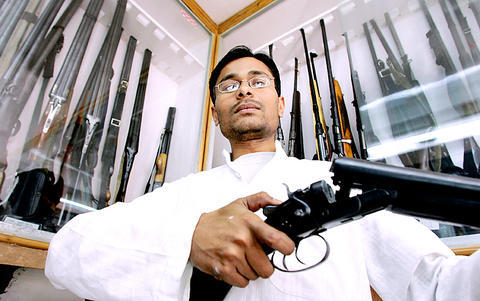Customers usually come from far and wide to buy rifles and shotguns from the dozens of tiny shops clustered in a bazaar in the ramshackle town of Kanpur, the gun capital of India's Uttar Pradesh state.
But business has stopped. Arms sales have been banned as the country's largest state -- infamous for lawlessness -- holds month-long polls under heavy security, halting one of the area's most profitable sectors.
"This has been traditionally a very large market for the guns and perhaps it's one of the biggest markets in northern india," said senior city police officer Alok Singh.

PHOTO: AFP
"It not only caters to Kanpur but there's an adjoining area where there is a tradition of bearing arms. So they come to Kanpur to purchase their arms."
Singh was referring to Bundelkhand, an undulating arid area that spans southern Uttar Pradesh and neighboring Madhya Pradesh state and is known for a macho culture and the prevalence of bandits.
"In these parts, it is very much a culture to have a weapon slung across your shoulder," said Javeed Ahmed, a senior police officer for Kanpur and surrounding areas.
"It is as much a requirement for security as a cultural thing."
There are approximately 130 gun shops in this city, according to the local arms licensing office, most of them along the old Meston Road in the heart of Kanpur, a former mill town sometimes called India's Manchester.
With little industrialization in these areas, guns are also one of the few status symbols available to locals, he added.
"There's no industrialization, nothing to divert attention," said Ahmed.
At one point some districts in the state even used the popularity of guns as a tool in population control, offering gun licenses to those who brought in people to be sterilized.
Many of Kanpur's shops have old fashioned names -- like "Imperial Arms" and "Lords Gun House" -- with attractively painted signs portraying rifles and, on occasion, fearsome-looking men wearing sunglasses.
At the moment, however, with a seven-stage election underway, no guns may be sold. Shopkeepers are passing the time cleaning the weapons, painting the shops and talking politics.
On Friday, 16 million voters were eligible to vote for 58 members in the 403-seat state assembly under the watch of almost 70,000 paramilitary troops in the second stage of voting.
In the run-up to the elections, residents have been asked to deposit their weapons with local gun shops.
"We have about 200 guns in our deposit," said clean-cut Afzal Alam, 30, whose grandfather started the Mehboob Alam & Sons arms store some 50 years ago.
The store sells Indian-made as well as vintage rifles from World War II and a Colt rifle manufactured in Connecticut in 1888, which would sell for about 100,000 rupees (US$2,270).
Crime has gone up and more and more people come to buy guns for self-protection, added Alam.
"People buy guns a lot for weddings also," said Gulzar, 26, who uses only one name and runs Universal Guns, also owned by the Alam family.
Gulzar explained that many people use rifles to shoot bullets in the air to express their joy as they sing and dance in the procession that accompanies a groom to his wedding.
Gun sales have been good in recent years, said gun store proprietor Zia-ul Islam Chowdhary, general secretary of the Kanpur arms dealers association.
"Business is comfortable," said Chowdhary, "This government is issuing more gun licenses."
There are approximately 800,000 arms license holders in Uttar Pradesh, according to the state's home ministry, more than 20,000 of them in Kanpur.
The current government, which is run by Mulayam Singh Yadav and the Samajwadi Party, has been blamed by opponents for being soft on crime.
The state's growing reputation for lawlessness has been a campaigning point for the opposition in the polls, in which Yadav is fighting for re-election.
But police officer Ahmed said that in many cases, guns were vital for the safety of villagers in rural areas where bandits roam and where there may be only one policeman for 2,000 residents.
"Someone living in a far-flung hamlet has some justification to have a weapon if he can have afford one," said the police officer.
Some gun shop owners like Chowdhary are sure business will pick up once votes are counted on May 11.
"The customer who is not able to come now will come later," Chowdhary said.
"If he has to buy a gun, he's going to buy a gun," he said.

Thousands gathered across New Zealand yesterday to celebrate the signing of the country’s founding document and some called for an end to government policies that critics say erode the rights promised to the indigenous Maori population. As the sun rose on the dawn service at Waitangi where the Treaty of Waitangi was first signed between the British Crown and Maori chiefs in 1840, some community leaders called on the government to honor promises made 185 years ago. The call was repeated at peaceful rallies that drew several hundred people later in the day. “This government is attacking tangata whenua [indigenous people] on all

RIGHTS FEARS: A protester said Beijing would use the embassy to catch and send Hong Kongers to China, while a lawmaker said Chinese agents had threatened Britons Hundreds of demonstrators on Saturday protested at a site earmarked for Beijing’s controversial new embassy in London over human rights and security concerns. The new embassy — if approved by the British government — would be the “biggest Chinese embassy in Europe,” one lawmaker said earlier. Protester Iona Boswell, a 40-year-old social worker, said there was “no need for a mega embassy here” and that she believed it would be used to facilitate the “harassment of dissidents.” China has for several years been trying to relocate its embassy, currently in the British capital’s upmarket Marylebone district, to the sprawling historic site in the

‘IMPOSSIBLE’: The authors of the study, which was published in an environment journal, said that the findings appeared grim, but that honesty is necessary for change Holding long-term global warming to 2°C — the fallback target of the Paris climate accord — is now “impossible,” according to a new analysis published by leading scientists. Led by renowned climatologist James Hansen, the paper appears in the journal Environment: Science and Policy for Sustainable Development and concludes that Earth’s climate is more sensitive to rising greenhouse gas emissions than previously thought. Compounding the crisis, Hansen and colleagues argued, is a recent decline in sunlight-blocking aerosol pollution from the shipping industry, which had been mitigating some of the warming. An ambitious climate change scenario outlined by the UN’s climate

BACK TO BATTLE: North Korean soldiers have returned to the front lines in Russia’s Kursk region after earlier reports that Moscow had withdrawn them following heavy losses Ukrainian President Volodymyr Zelenskiy on Friday pored over a once-classified map of vast deposits of rare earths and other critical minerals as part of a push to appeal to US President Donald Trump’s penchant for a deal. The US president, whose administration is pressing for a rapid end to Ukraine’s war with Russia, on Monday said he wanted Ukraine to supply the US with rare earths and other minerals in return for financially supporting its war effort. “If we are talking about a deal, then let’s do a deal, we are only for it,” Zelenskiy said, emphasizing Ukraine’s need for security guarantees